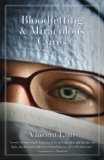Summary | Excerpt | Reading Guide | Reviews | Beyond the Book | Readalikes | Genres & Themes | Author Bio

Stories
by Vincent Lam
Sometimes, Fitzgerald closed his eyes and mouthed
words while he memorized. Ming pretended to look out
the window, allowed herself to briefly watch the halfimage
of his reflection speaking silently. She could see
that he was immersed in the material, that he was trying
to get inside it. She admired this, and longed for
Fitzgerald because of it. Ming had decided to be occupied
primarily with the facts in her textbooks, and less
with comprehension. Ionic channels were not a wonderful
riddle to her, as she knew they were to Fitzgerald.
They were simply a means to an end, that end being a
perfect set of grades and a medical school admission
letter. Hers was the more common attitude in the life
sciences faculty, and so Ming regarded Fitzgerald as
being pure and noble, if strategically unwise.
Midway through the exams, they grew into a twice
daily session of going through questions. Fitzgerald
proposed that they use these question sessions as breaks,
and so they visited the library cafeteria twice a day.
Ming considered going to the cafeteria to be an indulgent
use of time, but she decided that it was acceptable
as long as they discussed only academics, and as long as
she didn’t spend too much time actually enjoying
Fitzgerald’s company.
They ate, clarified the puzzles of cell membrane
physiology, and talked about their need to become
physicians. Others were not genuine, they agreed, and
transparently wanted to become doctors for money and
prestige. Ming and Fitzgerald wanted medicine for the
right reasons, they told each other: service, humanity,
giving. Because their motivations were clean, they were
certain they deserved it more than those among them.
They did not ask why they wanted to serve, be humane,
or to give. These simply felt like the right motivations,
and being correctly motivated should improve their
chances of success. This was enough, and these sentiments
felt easy and immune from questioning. If
forced to reflect, both Ming and Fitzgerald would have
had to admit that these convictions were, at their core,
somewhat improvised. They did not challenge each
other, but instead reinforced each other’s sense of
moral correctness as a virtuous conspiracy of two.
Their consuming ambition was the same as those of
their classmates, but they agreed that most of the people
around them were fake. Ming did allow that,
although she did not want to pursue medicine for the
money, earning a good living was important to her.
“I like being obsessed by things,” said Fitzgerald one
day. “It suits me.” He did not tell Ming that he supposed
that if his attentions had happened to fall upon
something other than medicine, he would have been
equally engrossed with it.
Ming paced exams like a marathon. In a three-hour
examination, she finished her initial draft within a
strictly self-enforced two hours. For twenty minutes,
she returned to uncomfortable questions she had indicated
with a lightly pencilled star. After reworking her
response she erased the star because she didn’t believe
in changing an answer more than once. For another
twenty minutes, she focused on the crucial phrasing of
the questions, ensuring that her answers corresponded.
They altered questions subtly from the previous years’
versions in an attempt to throw off those who studied
from the prohibited, but widely available, pool of old
exams. Ming was vigilant that a four-point question
receive no more than four indisputably correct facts in
the answer; it was possible to lose marks by including
incorrect extra information. She sat straight, with her
ankles crossed under her seat.
In her assigned seat behind Fitzgerald, Ming sometimes
glanced up at him, saw him curled over his
papers. In some sessions he wrote furiously until the
procter came to take the paper from him. At other
times, he finished writing within an hour and then
fidgeted while everyone else worked. Fitzgerald constantly
slipped his shoes on and off, and once accidentally
kicked his right shoe two rows across. The
proctor retrieved it, and pulled out the insole to check
for any hidden papers before returning it to Fitzgerald
with a recommendation that his shoes stay on his
feet.
The above excerpt is the complete text of the short story "How To Get Into Medical School, Part 1" , pages 1-30 of Bloodletting & Miraculous Cures. Copyright (c) Dr. Vincent Lam, 2007. Reproduced with permission of the publisher. All rights reserved.
Your guide toexceptional books
BookBrowse seeks out and recommends the best in contemporary fiction and nonfiction—books that not only engage and entertain but also deepen our understanding of ourselves and the world around us.